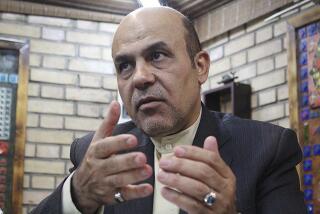A look inside Iraq’s Interior Ministry
Reporting from Beirut — Say the words “interior ministry” in almost any Middle Eastern country and you’re certain to evoke fear and resentment.
In the name of protecting the homeland, internal security forces in just about every Arab country limit civil liberties, intrude on private lives and abuse human rights.
Iraqi Interior Minister Jawad Bolani bills himself as an independent-minded democrat and civil servant who wants to secure his country without resorting to heavy-handed tactics that might undermine what he describes as his nation’s democratic progress. He took a break from a recent conference of Arab interior ministers in Beirut to sit down for an interview with The Times.
In Iraq 2½ years ago, you said that death squad infiltration of your ministry was a problem that you were addressing but that you didn’t want to disparage the work of most of your officers. How did you fix the problem?
In 2006, the security situation was not good, the ministry was infiltrated. Today we have an institution functioning well and following rules. A lot of reforms have been implemented. We worked on creating an institution that monitors the country but remains under the law.
We also cleansed the institution of bad elements, replacing 58 senior officers.
Was it a matter of increasing intelligence capacity?
A few months ago, we inaugurated a new intelligence center equipped with the best technological equipment. We rely a lot on intelligence information to fight against [the group] Al Qaeda [in Iraq] and other outlawed militias. We have more than 10,000 elements [operatives] in the intelligence agency of the ministry.
These 10,000 elements, what have they accomplished so far?
They submitted 43,000 reports on various issues. Through the information they provided, we were able to arrest more than 800 wanted elements.
Are they on the ground and in the mosques infiltrating or are they just sitting in offices?
The means they have at their disposal are numerous. They do rely on infiltration but also on other means. We have the “130” tip number which any Iraqi can use anywhere in the country. We have senior officers working all over the country. They have their own resources and informants who provide them with information.
The agency is a nascent institution that is growing and needs more human resources and more funds. But we are close to Al Qaeda and its movements and activities. We have the capacity to stop them quickly.
Is it part of your mandate to protect the country from infiltration by foreign states?
Protecting the border is part of the mandate of the Interior Ministry. The situation of the last years has changed. We had 173 border control bases in 2006 around the border. Now there are 700. We have a budget of $700 million for monitoring the border, for radars, for [satellite] systems.
Cooperation with other states has improved the situation along the borders. There are joint committees with all neighboring countries, Saudi Arabia, Iran, Syria and Turkey.
Clearly the number of terrorists infiltrating the country has decreased, but has the intelligence infiltration of the Iraqi government by other governments as well?
The interference has decreased. The infiltration by foreign intelligence is governed by higher political interests of other countries who see democracy as a threat. Our democratic system is the source of envy by countries around us.
Would you say all neighboring countries are playing a better role?
Relations between Iraq and neighboring countries are moving in a good direction that guarantees the interests of all parties.
Before Iraq signed the status of forces agreement with the United States [governing the presence of American troops in Iraq],the prime minister of the country had to fly to Iran to get approval. Is that healthy?
The Iraqi government dispatched envoys to neighboring countries to explain about the agreement and Iraq’s need for it and to say that it will not be a threat or directed against any foreign country.
You are not concerned that Iran has too much influence in Iraq?
We are talking about a new political situation in the region and the world. There is a new administration in the U.S., new challenges, new ways to deal with issues that are endangering stability in the region.
Iraqis know very well their interests and will not accept any foreign interference. Our message to others: We respect your sovereignty; you should respect the sovereignty of Iraq.
Today, is the biggest threat to Iraq from inside or outside?
Both. But Iraqis are committed to their role in stopping these threats. Iraqi people support a lot the democratic process.
What about cleric Muqtada Sadr [an opponent of the U.S. presence]? Is he part of the democratic process?
Democracy allows opposition to voice its opinion. Democracy is an ongoing process that cannot be stopped despite all obstacles.
What is important is that opposition should always be carried without violence and threats. Any peaceful opposition is accepted. Our ministry gives people the right to protest and we protect people who want to voice different opinions than the ones we hold. A strong Interior Ministry committed to implementing laws is a guarantee for democracy in Iraq.
You talk like a politician more than a cop. Are you running for prime minister?
As a citizen I talk about democracy. As a minister I talk about security. Without security there is no democracy.
More to Read
Sign up for Essential California
The most important California stories and recommendations in your inbox every morning.
You may occasionally receive promotional content from the Los Angeles Times.










